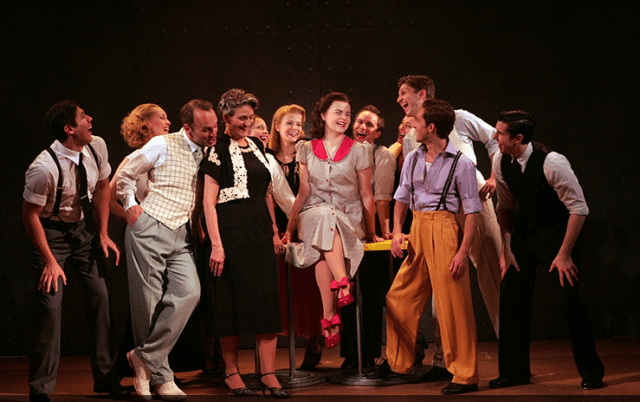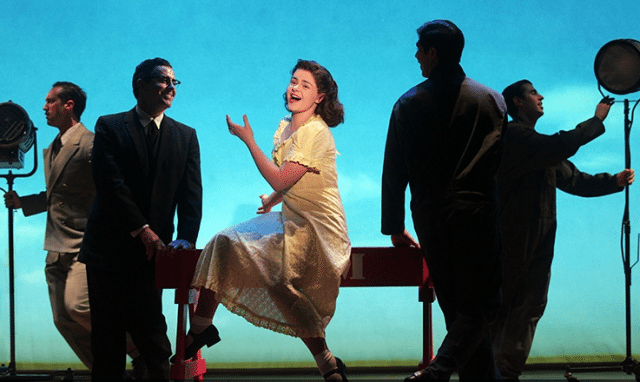

The tragic life of Judy Garland has been the object of works of fiction before including an Emmy-winning miniseries and Broadway musicals like End of the Rainbow; however, her early life remains rather unexplored, which is why Chasing Rainbows feels like a breath of fresh air. The show focuses on Judy’s early life, from age six till when she got cast as Dorothy in The Wizard of Oz. Judy is played by Ruby Rakos, a wonderful actress who not only looks the part, but also has the pipes to go along with it. Bright-eyed and full of energy, Rakos seems to have been born to play the part. Having started in theatre as a young girl herself - she made her Broadway debut at age 12 in Billy Elliot - she shares Judy’s work ethics and passion for performing, and when she opens her mouth and the notes start to pour out from within her, she hypnotizes you in the very same way Garland did. I had the opportunity to speak to Rakos about playing one of the most legendary performers in history, why it’s important to have women storytellers, and what are some of her favorite Judy moments.
What’s the earliest Judy Garland memory you have?
Probably The Wizard of Oz, before doing this show I didn’t know much about Judy other than Oz and her 60s show.
What is your absolute favorite Judy performance?
I’ve mostly seen her earlier stuff, so I love Love Finds Andy Hardy and I love her Carnegie Hall album.
I always say if I could build a time machine and go see something that day would be it.
Yes, one hundred percent!
What’s your favorite song in the Carnegie Hall album?
I love, love, love the “Almost Like Being in Love”/”This Can’t Be Love” medley, and “The Man That Got Away” always makes me cry. They’re my favorites and also opposites in a way!
How has it been to be part of this project throughout its entire production?
It’s been about three years since I had my first creative meeting with the team. It’s been long, but it’s been a lot of fun. I’d never worked on a new musical before and didn’t know what to expect, so in my mind this is all normal. No process is normal, but this is the only thing I have to compare anything else to. It’s been fun to watch the show grow and change, every time I get a new version of the script I’m like “this is it!”, but then we get a new one and I’m like “no, this is it!”
You started working when you were very young, did learning more about Judy’s early career make you think in a different way about starting work when you were a child?
I was extremely lucky to have very supportive parents, I was the one who made them sign me up for dance classes. They never forced me into anything and have always supported me in what I’ve wanted to do. When I did Billy Elliot I thought that was the norm, I started working when the show had been going for a while and everything was set, so you can’t really ask questions about your character or things like that. It’s been interesting as an actor to work on this show and ask questions and have an input. I’m allowed to disagree.
Why do you think it’s important that it’s a woman, Tina Marie Casamento, who created the show? Can you talk about the importance of having women tell women’s stories?
A woman knows a woman’s perspective. A show like this has so many women’s issues in it, things like body image and what not, things that can be easily glossed over by someone who doesn’t understand the significance of it. Having women like me, Tina Marie and our director Tyne Rafaeli, helps bring those issues to life in a way they haven’t been in the past. I feel it can resonate more with people this way.

Judy received endless scrutiny from her studio and the press throughout her career, how do you think this has changed for women?
I think the way this has changed most is that we’re more aware of it, back then it was normal, but now we’re more aware of it and are making a conscious effort to change it. After people see the show they tell me “you’re so pretty and thin”, which is kinda the point, Judy didn’t fit into Hollywood’s standards of beauty so they were trying to turn her into what they thought was commercially viable.
The show ends after The Wizard of Oz, did going behind the curtain change the way you see the movie?
It has changed the way I look at Oz, the only way I can connect to Dorothy now is by going through Judy, which is not what people want at auditions, but it’s the only way I can do it now. “Over the Rainbow” is about her father, mortality and getting to the other side which has a deeper meaning than you’d think, in the movie it’s about a little girl wanting magic, but now it’s much deeper for me.
Besides a celebration of Judy, would you say the show is about hope?
Definitely, the same with The Wizard of Oz, it doesn’t end with everything being fixed or solved, she’s still in the same place she was when the twister hit, her circumstances haven’t changed, but she has newfound hope of what her future can be.
What are the challenges in playing Judy early in her career while being aware of the tragic future that awaited her?
I don’t really think about it, in character she doesn’t know her future so I can’t know it either. Judy never had a chance, if you see this show you see why things happened to her, she was always set up with so much against her, that the fact she was as successful as she was is a miracle!
She didn’t have a chance but she also didn’t have a choice. She couldn’t stop performing, is this something you have in common with her?
I’ve no idea what I would do if I wasn’t an actor and couldn’t sing. It’s that ambition that sometimes scares you that Judy had and I have, which propels us forward and she sought approval from the audience that she couldn’t get from her life. She needed to perform to feed her family, but also to feed herself, she needed that feeling of love and approval.
Why do you think that Judy remains such an icon after all these years?
A lot of it is how she’s so good at using her own life and her own pain and joy and putting it into her music, in a way it reflects our feelings. We can identify with her as she sings, it’s like she’s in your head and she knows what you’re thinking. We ask ourselves “how did she put into words something I’ve never been able to articulate”.
For tickets and more information on Chasing Rainbows click here.